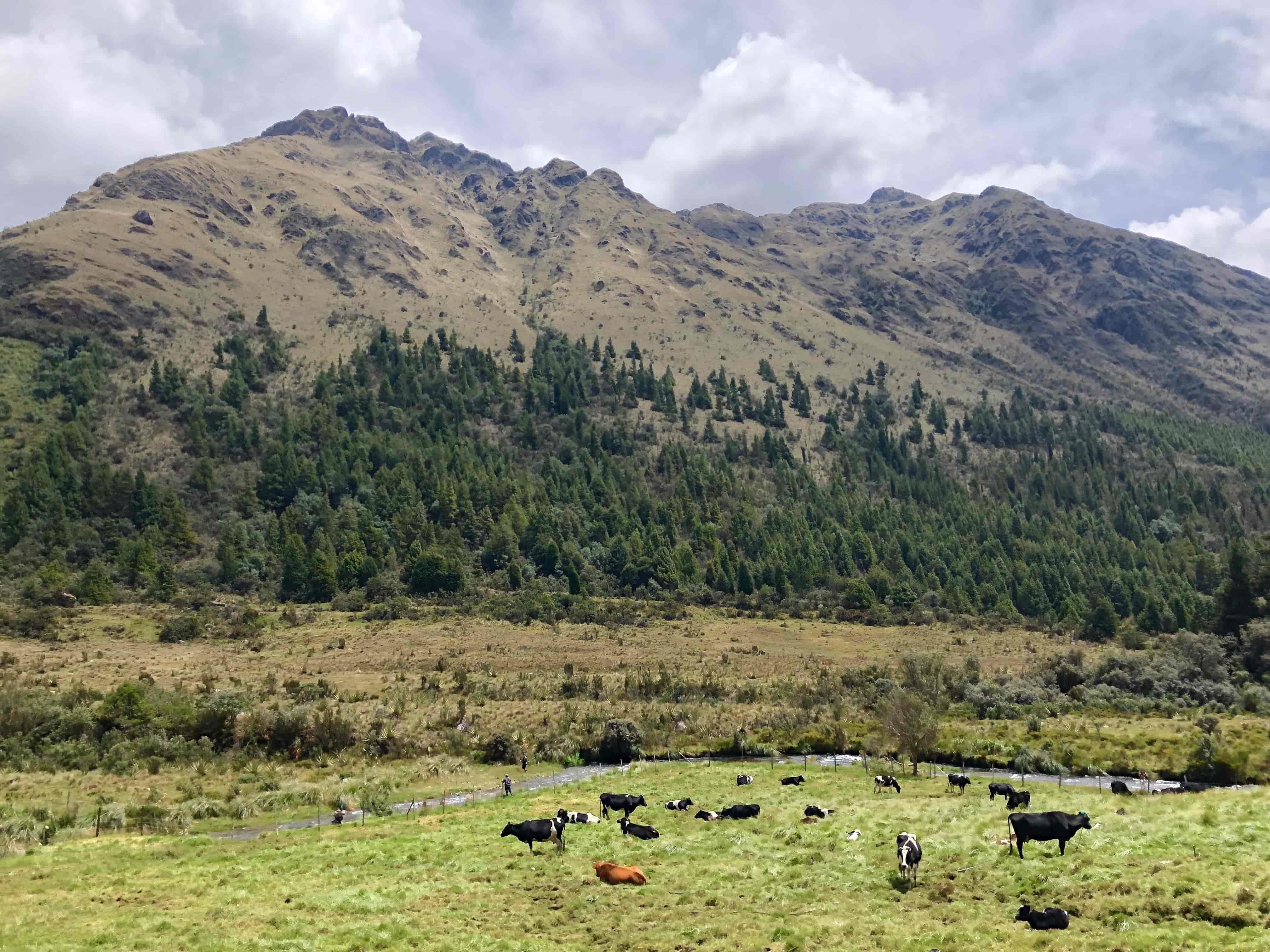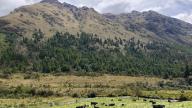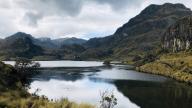On November 29, 2018, Canadian mining company INV Metals (TSX: INV) released the results of the feasibility study for its Loma Larga gold-copper-silver project in Kimsacocha, Ecuador. The company’s press release and corporate presentation on the study communicate an unwavering sense of local support for the project and a commitment to water and environmental protection.
Candace MacGibbon, the company’s CEO and 5% shareholder, stated in the company’s press release that:
Loma Larga is one of five strategic mining projects identified by the Government of Ecuador and will be the next large-scale mining development project to be financed and permitted in the country…With the demonstrated strong support of the Ecuadorian government and our surrounding local communities of Chumblin, San Gerardo, and Victoria del Portete, INV Metals plans to aggressively move the Project forward aiming to break ground in early 2020, with the goal of achieving first gold concentrate production in late 2021.
Translations of both corporate documents were circulated among communities around Kimsacocha and in the nearby city of Cuenca. The company’s perceived confidence in achieving a ‘social licence’ to operate were received with much concern by local and regional organizations.
Fausto Loja, President of the Juntas de Agua del Pueblo (Centro) Cantón Girón (Central Community Water Council of Girón Canton), discredits the company’s campaign vehemently refuting the company’s claims:
It is not true that we agree with mining. The communities of Girón do not agree with what the mining company is saying, because there have been no assemblies with all the free and informed dissemination so that the people know the truth of what It will happen. If we have to give our lives we will give them in order to protect our children and grandchildren, but the mining company will not enter our communities.
Communities have been involved in a strong oppositional resistance to the mine for nearly two decades, and yet, despite their best efforts, they continue to face “aggressive moves” by the company to advance the project.
Communities have said “no” time and again to mining
For local residents living around the proposed mine, there is much confusion and frustration as to why the project continues to advance even though they have persistently mobilized in their communities and through the ballot box to oppose the project.
Local leaders like Manuel Rigoberto Sánchez Fajardo, the President of the Junta de Agua de Riego Río Portete (Portete River Irrigation Council), refuse to accept the company’s position, noting instead his organization’s commitment to raising awareness about the dangers of mining and promoting a positive vision of protection of life.
The mining company can never assure us that we all agree; they have never consulted us. Since 2000, we have been fighting knowing very well the ravages of mining exploitation. We know that they are saying that there are people who support mining, but, in exchange for what? We will not let them enter, we will not put our hands in our pockets [and do nothing],we have to keep encouraging and motivating the people to conserve our sacred waters.
On numerous occasions, local and regional residents have rejected mining. Just ten months ago, in February of this year, communities in the Kimsacocha region voted overwhelmingly in majority opposition to metal mining in a popular referendum. When asked if they were in favour of amending the Ecuadoran Constitution in order to prohibit, without exception, metal mining in all of its phases in protected areas, “intangible” areas (areas of cultural significance) and urban centres, residents of the Azuay province (the province where Loma Larga is located) voted in overwhelming favour of prohibiting mining (72% overall, and higher in the cantons of Girón, Cuenca and San Fernando).
According to José Virgilio Ramón Quezada, President of Los Sistemas Comunitarios de Agua del cantón Girón (Communitarian Water Systems of Girón Canton), they are caught between a rock and a hard place trying to defend their water:
The Girón communities do not agree with mining and the proof is in the national referendum on the question of mining where over 81% of the town of Girón said “No” to mining. They [the company] never consulted us about anything ... that's why we fought for the consultation in order for the mine to leave. The government is waiting for the supposed royalties, meanwhile we are forced to await pending catastrophe. The only thing we have left is the Right to Resistance in Article 98 [of the Ecuadoran Constitution] and we will make sure it is respected.
Concerns about water are fundamental to people’s defence of life against the mine
Water has always been a central point of concern for local opposition to the mine. Many people depend on water, in the rural areas and in the city of Cuenca, to forge their livelihoods as agriculturalists, and as city dwellers used to drinking water right out of the tap.
The proposed project was determined in 2016 by esteemed mining engineer James Kuipers’ Expert Report to pose great and irreparable risk to ecologically sensitive highland watershed regions referred to as “páramos” due to the high arsenic content of the ore and the inability of mining operations of the kind proposed to contain water or control its movement.
According to Jhonny Marcelo Tapia Mogrovejo, Secretary of Los Sistemas Comunitarios de Agua Cantón Girón,
We are clear that mining would cause total destruction in the páramos in the canton of Cuenca, where more than 600 water sources are born. Moreover, we are agricultural and livestock-producing communities, which is why we have been in resistance for more than 17 years.
And, communities fear the worse for their futures. For them, it isn’t worth the risk:
Mining is something that will harm communities especially with respect to our water. No one agrees that there be mining. We know that in other countries mining leaves a legacy of infertile and empty land where water flows are changed and left without direction. Here, it would produce a drought in Girón; we would have to leave our homes. No to mining, yes to life. Gold cannot be eaten. Mining will not happen.
– Mery Cumandá Quintanilla Hurtado, President, Canal de Agua Celata-Santa Marianita-La Cofradía y San Juan de Pambabel (Celata-Santa Marianita-La Cofradía and San Juan de Pambabel Canal)
In these newly released results (see Corporate Presentation, November 29, 2018), the company notes that mine discharge will be diverted away from the Cuenca watershed in order to ensure that the city’s water supply will not be affected by the mine’s activities.
The urban environmentalist collective from Cuenca, Yasunidos Guapondelig, refutes the company’s claims. For Cuenca residents, the issue isn’t simply a problem with where the mine effluents will travel, but that there will be mine effluents at all. The organization notes that an environmental audit of the city’s potable water company concluded that the Loma Larga project will negatively affect the “quality and quantity of water from the Yanuncay River, which supplies the Sustag potable water plant. For this reason, the city council declared the territory of Cuenca free of metallic mining in 2017, as well as the council of the province of Azuay in 2016.”
Yasunidos calls the company’s latest reporting an explicit attempt to “divide people into first- and second-class citizens depending on where they live,” noting that the company’s claim “is reproachable from every point of view. The rights of the populations on the other side of the Andes matter as much as our rights. INV’s statements are fraught with deception and discrimination.”
INV confident enough to…try to block a popular consultation process?
On November 19, 2018, the Ecuadoran National Electoral Council resolved that a popular consultation process be held in canton of Girón. The company is disputing this decision.
On December 10, INV submitted an appeal to the Electoral Tribunal to revoke the Electoral Council’s decision. Given its insistence on community consensus in favour of the project, it is curious that the company would not want a consultation process in the region where they claim to clearly have strong community support.
For Jhonny Tapia, the company’s opposition to the consultation process is clear:
We are proposing the popular consultation to prevent mining in the Loma Larga-Kimsakocha project… the INV mining company now wants to prevent the consultation at all costs, so that the people do not speak out.
But, despite the company’s best efforts, communities won’t give up
This struggle, now nearly two decades old, has taken a toll on people’s bodies, on their economic activities and on their social relationships. But, it has yet to undermine people’s commitment to defending their territory, and the water that a great part of the country depends on. Their statements are inspiring and speak for themselves:
While mining lurks, nobody sleeps quietly because death also lurks. Our communities are awake united and decided to die if necessary. But, mining will not enter our sacred hill from where our drinking water comes from, for our gardens, our food, our animals, our life. We are united, all the communities of Tarqui, Victoria de Portete, Girón and Cuenca. Even the political leaders do not want mining because it is death. These mining companies who come to destroy our lives, will never be able to enter our communities unless they kill us.
– Diana Quesada, President, Escuela Agroecológica de Kimsacocha (Agroecological School of Kimsakocha)
We will quietly stand guard so that they do not give us drought, that they do not contaminate us. The first slash to the Pachamama will awaken an Indigenous fury in defence of water and life. The territory is sacred to our people and the merchants of ambition and greed will not enter. Kimsakocha is the symbol of resistance in Ecuador.
– ECUARUNARI, Confederación Kichwa del Ecuador (Ecuadorean Confederation of Peoples of Kichwa Nationality)
The glitter of gold that jumps to the view the pockets of the extractivists will not happen in Kimsakocha. Nothing will annihilate the fierceness of the mountains and lagoons. The Pachamama is more powerful than the ambition of the mercenaries of gold. We will not rest in from our fight and resistance against the looters. The defence of water is the defence of our lives.
– CAOI, Coordinadora Andina de Organizaciones Indígenas (Coordinadoration of Andean Indigenous Organizations)
We have presented many actions to the state to prevent the mining from occurring in our Kimsakocha… We must denounce the risks run by leaders at a personal and family level for being at the forefront of resistance in favour of life, the páramos, the water. Mining will never enter our lands, because we will defend it by spilling our blood because it is the best inheritance we can leave to our children.
– Jhonny Marcelo Tapia Mogrovejo, Secretary, Sistemas Comunitarios de Agua Cantón Girón (Communitarian Water Systems of Girón Canton)



